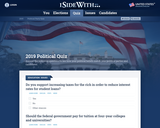
Students can answer questions to see how their political beliefs match their political parties and candidates.
- Subject:
- Civics and Economics
- Social Studies
- Material Type:
- Questionnaire
- Author:
- isidewith.com
- Date Added:
- 11/26/2019

Students can answer questions to see how their political beliefs match their political parties and candidates.

Students will work individually or in pairs to design 3D-printed visual representations of one or more individual rights found in the Bill of Rights.

Student teams will work together both inside and outside the classroom to complete a “GooseChase” scavenger hunt. Students will demonstrate mastery of the basic principles of international trade.

Students will create a stock market portfolio and keep track of the records over a two week period. During the process, students will keep track of the stock and the price per share for each day. At the end of the two week time frame, students will create a powerpoint presentation and an audio recording discussing their portfolio in how they started and how their stocks ended at the end, what they learned about investing in the stock market (e.g. trends), and how they would potentially use the information when they get older.

Student teams will work together both inside and outside the classroom to complete a “GooseChase” scavenger hunt. Students will demonstrate mastery of the principles of supply and demand.
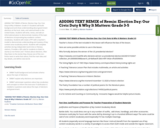
ADDING TEXT REMIX of Remix: Election Day: Our Civic Duty & Why It Matters: Grade 3-5
Students will build background and show understanding about government elections at the local, state, and national levels in the United States.
Students will write, revise, and edit an informational piece to demonstrate mastery of the topic of elections incorporating key academic content vocabulary.
Students will create a PPT with a teacher's model to demonstrate understanding and mastery of key content area vocabulary words.
Students will complete activities during independent work time or literacy stations. Provides a QR code for students to listen to stories (2 non-fiction and 1 fiction) about elections. After they listen to the stories they choose one of the non-fiction texts to write facts about, find the main idea and key details, and define new words

Students will explore the various ways they can ensure their voices are heard regarding issues they care about. To help students appreciate their own value, intelligence, and potential as political actors (Anyon, 2005, p. 179) students will role play different ways of taking political action and reflect on ways to more effectively lobby for change.

Students will examine changes in African American voting rights throughout North Carolina's history. This lesson begins by reviewing key vocabulary. Students then independently research the history of African American voting rights in North Carolina using a primary source web quest or jigsaw activity.

Students will learn about North Carolina's little known eugenics program, as well as explore the constitutionality of state mandated sterilization by reviewing the NC Supreme Court case, In re Moore. Stidents will culminate this lesson by making recommendations on how the state should make amends for the program's past controversial actions, as well as examine actual consolation recoomendations recently made by the North Carolina's General Assembly.

Students will explore the Age of Enlightenment through a Power Point presentation and class discussion. Students will then further explore this period of history and its prominent figures by designing a dinner party for 12 Enlightenment thinkers. This project will encourage students to learn more about the period and the philosophers associated with it, as well as synthesize what they have learned while utilizing higher order thinking, group work skills, and creativity.

Students will explore the Age of Enlightenment. Students will then further explore this period of history and its prominent figures by designing a dinner party for 12 Enlightenment thinkers. This lesson will encourage students to learn more about the period and the philosophers associated with it, as well as synthesize what they have learned while utilizing higher order thinking, group work skills, and creativity.

Albion W. Tourg spent his lifetime (1838--1905) dedicated to fighting for equality and justice, during a period when rights for many were severely restricted or entirely denied. In this lesson, students will learn about the life and contributions of Albion Tourg through class discussion, reading, and group work.

In this lesson, students analyze the arguments used by Alexander Hamilton and Thomas Jefferson regarding the role of the government in managing the economy.

In this lesson, students read primary and secondary source documents about the Supreme Court case Allegheny County v. ACLU and the 1st amendment. Students then answer analysis questions about the case. There is a teacher answer key included in the lesson.
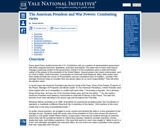
In this unit, students examine the powers of the executive branch with careful analysis of the president's war powers. Primary documents are used to establish arguments for and against the expansion of presidential prerogative.

After Sept. 11, 2001, the federal government created the Department of Homeland Security and tasked it with preventing future terrorist attacks on American soil. The creation of this massive and expensive bureaucracy resulted in a dramatic expansion of government scrutiny over individual Americans' behavior and, critics argue, a decrease in civil liberties. The degree to which these trends have made Americans safer is unclear.
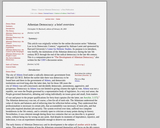
This resource briefly introduces the institutions of the Athenian democracy during the late 5th century BCE through the end of the racial democracy in the late 4th century.
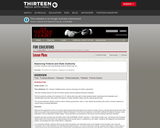
This plan includes lessons for two 45-minute classes and two optional extension activities.
The first extension activity is for teachers of U.S. history who may wish to help students better understand the Federalists and Antifederalists and their views about the balance of power between states and the national government.
The second extension activity could be used in history, government, civics, or law classes by teachers who wish to connect students to current issues involving federalism.

Students will gain an understanding of the role money plays in the US economy. The lesson begins with a simulation of a barter economy and discussion of the need for money. The students will then learn about the characteristics, functions, and types of money through discussion and reading an informative comic book about money.

In this lesson, students read primary and secondary source documents about the Supreme Court case Bethel v. Fraser and the 1st amendment. Students then answer analysis questions about the case. There is a teacher answer key included in the lesson.